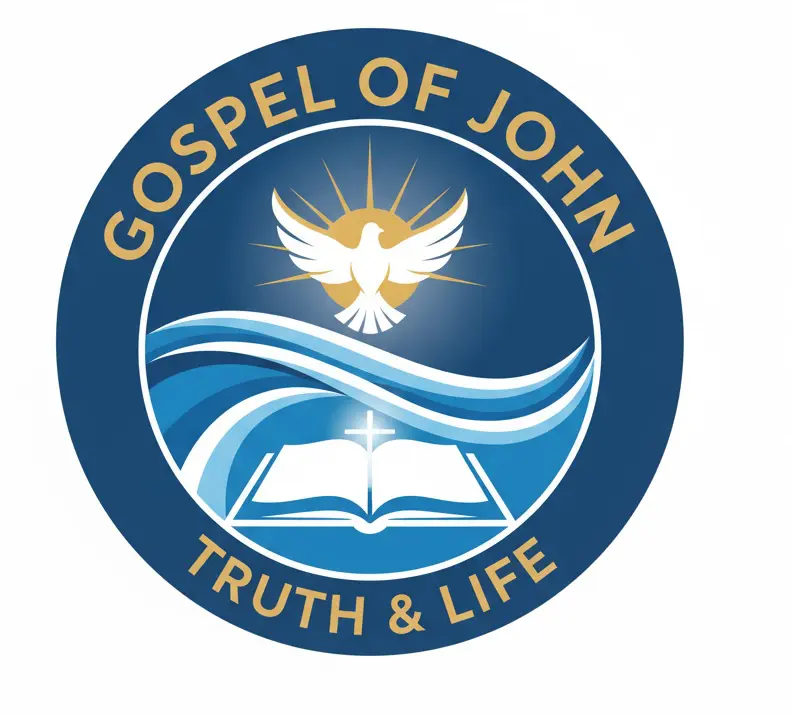Do you ever find yourself staring at an old photograph, trying to imagine the world spinning on before that shutter clicked? I have this picture of my grandfather as a young man. He’s leaning against a car that looks ancient now, and he has this confident look on his face. When I look at that photo, I’m not just seeing a relative. I’m trying to wrap my head around the fact that he had an entire life—a whole story—before I ever existed. It’s a strange feeling.
The Bible does something like that, but on a scale that stretches into eternity. It hands us a snapshot of a man from Nazareth and tells us his beginning came before all beginnings. The Gospel of John kicks off with some of the most staggering words ever put to paper, and at its core is a sentence so small it’s easy to miss, yet it holds up everything. To get the John 1:2 meaning is to step back in time, before time was even a thing.
John 1:2 says, “He was in the beginning with God.” That’s it. So simple. So direct. It changes everything. This isn’t just filler. It’s the line that locks in our understanding of who Jesus truly is, confirming what came before and setting the stage for what’s to come.
More in John Chapter 1 Category
Key Takeaways
- He’s Always Been Here: John 1:2 makes it clear that the Word (who is Jesus) didn’t just pop into existence. He has existed for all of eternity.
- Two Distinct Persons: The verse points out a vital detail. The Word was with God, which tells us we’re looking at two distinct persons—the Father and the Son—within the one Godhead.
- A Deep, Old Relationship: The way it’s phrased points to more than just being in the same place. It speaks of a constant, face-to-face, intimate relationship that existed before the world was made.
- The Foundation of the Trinity: This simple statement is a foundational piece for the Christian belief in the Trinity, showing that God is one being who exists as three distinct persons.
What Does It Really Mean to Be “With God”?
When you say you’re “with” someone, that can mean a dozen different things. You could be “with” thousands of people at a football game, just another face in the crowd. You can be “with” a coworker, focused on a project. But there’s a whole other level. It reminds me of my best friend from elementary school, Mark. We were a unit. When my mom would say I was “with Mark,” it meant we were off in our own world—building forts, trading secrets, planning to be astronauts. Our lives were tangled together. We weren’t just in the same room; we shared a reality.
That’s the kind of depth John is trying to get across here.
The original Greek phrase, pros ton Theon, is packed with meaning. It’s not just saying “beside God” or “near God.” It paints a picture of a dynamic, face-to-face relationship. Think of two people leaning toward each other, completely lost in a conversation. That’s the feeling. The Word wasn’t just hanging out in the divine realm. He was in an active, eternal, and intimate communion with the Father. This relationship didn’t kick off in Bethlehem. It’s a relationship that has no starting point. It’s the very essence of who God is.
But Wasn’t Jesus Born in Bethlehem? How Could He Be There “In the Beginning”?
This is the question, isn’t it? It feels like a complete contradiction. We all know the Christmas story. We’ve seen the nativity scenes. We read about a baby born in a specific town at a specific time in history. So how can a person with a birthday also exist before time itself? To sort this out, we have to grasp a key idea in Christianity: the difference between who Jesus is and what Jesus became.
The Word Became Flesh, He Didn’t Start There
John isn’t talking about the man Jesus, son of Mary. Not yet. He’s talking about the Logos—the Word. This eternal Word, who was both with God and was God, is the one who became human (John 1:14). His birth in Bethlehem wasn’t his origin story; it was his arrival story. It was the moment the eternal Son of God put on a human nature and moved into the neighborhood He created.
Maybe think about it like this: A songwriter can have a complete song, every note and every lyric, living perfectly in his head long before he ever picks up a guitar to play it. The song exists before it’s ever performed. In a much deeper way, the Son existed in perfect glory with the Father before He ever took on a human form. His humanity had a starting date. He, the Word, never did.
What Beginning Are We Talking About?
Our minds are trained to hear “in the beginning” and immediately think of Genesis 1:1: “In the beginning, God created the heavens and the earth.” John definitely wants us to make that link. He’s intentionally using the same opening line as the entire Old Testament. But he’s also pulling us back even further. Genesis 1:1 marks the start of our created world. John describes what was going on before that start.
Before a single mountain was pushed up, before the first star was lit, before time even began to tick, the Word was already there. He wasn’t made during creation; He was the one doing the making (John 1:3). So when John says “the beginning,” he means the absolute beginning. An eternal state of being where the Word was already living in perfect fellowship with God the Father.
Why Does John Say the Same Thing Twice?
If you read the first two verses of John’s Gospel back-to-back, you might scratch your head. Verse 1 drops three huge bombshells:
- The Word existed in the beginning.
- The Word was with God.
- The Word was God.
Then verse 2 seems to just re-state the first two ideas: “He was in the beginning with God.” Why the instant replay? John isn’t being redundant. He’s being a brilliant teacher. In a world where most people would hear this read aloud, repetition was how you made a point stick. It was the ancient equivalent of bolding and underlining a sentence. It meant, “Listen up. This part is critical. Don’t skim over this.”
My dad did the same thing when he taught me to drive. He’d say, “Check your mirrors, check your blind spot.” Then, just as I was about to pull into traffic, he’d say it again, with emphasis. “Hey. Remember. Check your mirrors and your blind spot.” He knew I’d heard him the first time. The repetition was for impact. It was to make sure the lesson was burned into my brain.
That’s exactly what John is doing. After making the mind-blowing claim that the Word was God, he pauses. He lets it sink in. Then he circles back to remind us: This person who is fully God was also, at the very same time, in a distinct, personal relationship with God. He’s hammering the point home so there’s no confusion. He is God, and He is distinct from the Father. Both truths have to be held together.
How Does This One Verse Help Us Understand the Trinity?
Without a line like John 1:2, the whole idea of the Trinity would be incredibly difficult to piece together from Scripture. This short sentence does some heavy lifting by giving us the basic framework. It introduces the idea that within the one God, there are multiple persons. It’s a mystery for sure, but the clues start right here.
How Can You Be God and Be “With” God?
Let’s walk through it. John 1:1c says, “the Word was God.” That settles His divine identity. He’s not a secondary god or a powerful angel. He is God, period. But John 1:2 says, “He was… with God.” That settles His distinct identity as a person. You can’t be “with” yourself in any meaningful, relational way. That one little word, “with,” draws a beautiful and necessary line.
This is the very seed of the Trinity. We have God the Father, and we have God the Word (the Son). They are not the same person, but they share the exact same divine nature. The Holy Spirit comes into the picture later, but the foundation is laid here. John 1:2 keeps us from two major historical errors:
- Believing the Father, Son, and Spirit are just three different hats that one God wears.
- Believing Jesus was the first and best thing God ever created, but not actually God.
John’s careful wording, locked in by verse 2, shows us that the Father and the Son are two distinct persons in an eternal, loving relationship, and together they are the one true God.
Why Does This Distinction Even Matter to Us?
This might feel like high-level theology, but it has a massive impact on the daily life of a Christian. The fact that the Father and Son are distinct isn’t just a fact for a quiz; it changes how we see everything.
- It’s the Shape of Our Salvation: The story of the Gospel is that the Father sent the Son to rescue the world. That act of incredible love needs two distinct persons—the One who sends and the One who is sent. If they’re the same person, the whole story of redemption becomes a confusing performance instead of a real relationship of sacrifice.
- It’s How We Pray: Jesus taught his followers to pray to “Our Father in heaven.” We approach the Father, but we do it in the name of the Son. Our ability to connect with God the Father was opened up by God the Son. That relational path to God only works if the Father and Son are distinct.
- It Tells Us Who God Is: Before a single thing was created, God was a community of love. The relationship between the Father and the Son was one of perfect, other-centered love. This means love isn’t just something God decided to do; it’s His very nature. He didn’t create us because He was lonely. He created us out of an overflow of the love that was already there.
What Was Going On in the World When John Wrote This?
John was a masterful communicator. He wasn’t just shouting into the void; he was speaking into a culture filled with big ideas. His decision to use the word Logos (translated as “Word”) was brilliant. It was a word that would connect with both his Jewish and non-Jewish audiences.
To his Greek-speaking readers, the Logos was a familiar idea from philosophy. For centuries, thinkers had talked about the Logos as the unseen, rational principle that held the universe together. It was the logic behind the cosmos. Hearing John’s introduction would have made them sit up and listen. For a deeper dive into this Greek concept, the Harvard Center for Hellenic Studies offers great insight into the philosophical background.
To his Jewish readers, the Logos would have immediately brought to mind the powerful “word of the Lord” from their own Scriptures—the creative command that brought light from darkness. It would also connect to the idea of God’s Wisdom being personified, especially in books like Proverbs, where Wisdom says she was with God before He created anything.
John takes this powerful, familiar idea and turns it on its head. He says to everyone, “You know that cosmic reason you talk about? That creative power you read about? It’s not a thing. It’s a person. And He was with God in the beginning, and His name is Jesus.” This was an absolutely revolutionary claim.
How Does John 1:2 Speak to Us Now?
Getting a handle on this ancient verse isn’t just for scholars. The truth packed into John 1:2 is meant to be a steadying force in our chaotic world. It’s a truth that can bring real hope to our real problems.
Finding Peace in an Unchanging Christ
Our lives can feel unstable. Things shift without warning. People we rely on leave, our health can take a turn, and our best-laid plans can go up in smoke. It’s easy to feel like you’re just trying to stay afloat. But the reality of John 1:2 is a solid anchor. The Jesus we trust isn’t just a good man who lived a long time ago. He is the eternal Word who was with God from the start. He was there before your story began, and He already knows how it ends. He existed before your biggest worry was ever a thought, and He’ll be there long after it’s a memory.
That truth brings a different kind of peace. The One who holds your life is the same One who was with God before the universe was born. Your situation isn’t going to overwhelm Him. He is the calm, steady center of a world that won’t stop spinning.
Realizing We Were Made for Connection
In a world that often breeds isolation, John 1:2 is a powerful reminder that we were made by a relational God, for relationships.
- Community is in our DNA: The Father, Son, and Spirit were in perfect community before anything else existed. Since we are made in His image, we are designed for connection—with Him and with each other. Feeling alone runs against the very grain of our design.
- God wants a personal relationship: The Word was face-to-face with the Father. Because of what Jesus did, we are invited into that same kind of intimacy. Prayer isn’t just launching a request to a distant power; it’s stepping into a real conversation with a personal God who knows your name.
- Love is the point of it all: The eternal relationship between the Father and the Son is the source code of love. That love is what started creation and what fueled the cross. When we love God and love the people around us, we are tapping into the most foundational reality in the universe.
The Beginning Before All Beginnings
John 1:2 is so much more than a theological data point. It’s a peek behind the curtain of eternity. It tells us that before the first star burst into light, before there was a planet or a particle, there was a relationship. There was a Father and a Son, living in perfect, loving unity.
And this eternal Word, Jesus, is the one who entered our broken world and our messy lives to invite us back into that very relationship. The meaning of John 1:2 isn’t just a history lesson. It’s a present-day reality. The One who was with God in the beginning is with us right now. He’s offering us that same eternal life and that same endless love. And that, truly, changes everything.
FAQ – John 1:2 Meaning

In what ways does John 1:2 help believers find hope and stability in their faith?
John 1:2 reassures believers that Jesus, the eternal Word, was with God before anything was created and remains present now. This provides a firm foundation of stability and hope, reminding Christians that Christ’s eternal presence offers peace amid life’s uncertainties.
How does the concept of the Word ‘being with’ God impact Christian understanding of the Trinity?
The phrase indicates a personal, face-to-face relationship between the Word and God, which is foundational for understanding the Trinity. It shows that the Father and the Son are distinct persons within the one God, united in love and divine harmony.
Why is the phrase ‘He was in the beginning with God’ important in biblical theology?
This phrase underscores that Jesus, the Word, existed before creation and did not originate at the birth in Bethlehem. It points to the eternal nature of Christ and helps us understand the preexistence of Jesus as part of God’s divine plan.
What is the significance of John 1:2 in understanding the nature of Jesus?
John 1:2 highlights that Jesus, as the Word, has existed since the beginning with God, emphasizing His eternal existence and divine nature. It confirms that Jesus was not created but has always been present in the eternal relationship with the Father.





